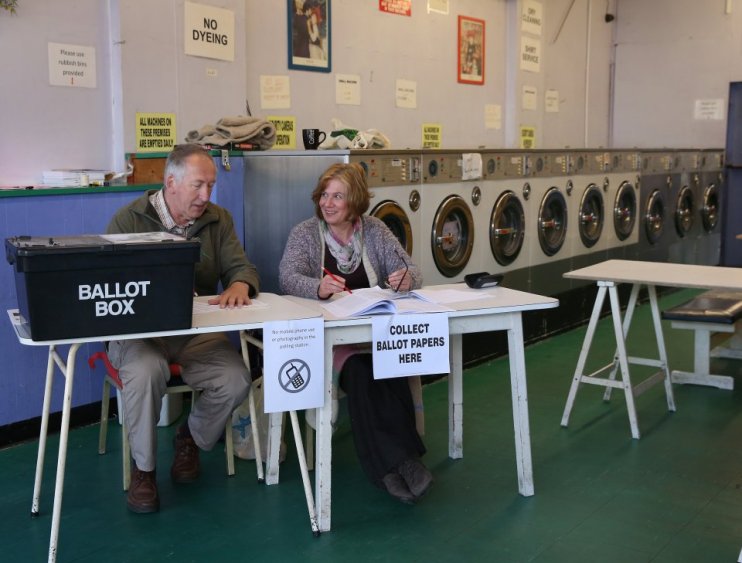Our Westminster politicians must pay heed to the Union

Pollsters at election time are a funny breed. Like Father Christmas, they drop nuggets of data into the hands of grateful journalists and analysts hoping to make sense of what is going on around them, trying to drown out the noise of election campaigns and listen to what really matters.
Yet the most interesting — and affecting — poll of this election campaign has precious little to do with the candidates who will soon be on your doorstep disrupting your planned silent night.
YouGov revealed that some four in 10 Brits would be relaxed about seeing Northern Ireland hived off from the Union if it meant that they got their preferred Brexit outcome. In fact, four in 10 of us wouldn’t be overly fussed if it left, regardless of what happens to our future relationship with our cousins on the continent.
It’s depressing on the one hand, as we reflect on the blood spilt on both sides of a religious divide over the past century and more. But it’s also revealing of a slow break-up of the Union, in reality if not legally, that has implications for us all.
Take, for instance, the increasingly dreadful state of Scottish education. When HM the Queen opened the Royal Bank of Scotland’s glass and steel monument to itself in Gogarburn in 2005, she called the new headquarters a “fine tribute to the many generations of ‘canny’ bankers who have made such a valuable contribution to the national economy”.
Now, considering what we know today about the foundations of that particular building (see the Parable of the Foolish Builder for further details), a tribute to the brains behind RBS’ growth may seem an odd jumping off point for a paean about the good old days.
But last week, a study conducted by Dundee University pointed out a system which had for centuries given those canny bankers the skills they needed is now as defunct as Fred Goodwin’s reputation.
Professor Jim Scott damned the SNP’s so-called Curriculum for Excellence. The terminology is baffling, but suffice it to say, things have got worse. Much worse.
The number of Higher passes in S5 (15–16 year olds) is down by a tenth over four years. Achievement of “National Qualification Levels 3 to 5” by S4 pupils is down by a third. The level of “zero achievement”, he wrote, has also risen.
Rightly, opposition parties in Scotland were livid, while the myopic single issue party that is the SNP — whose main ambition in creating said curriculum simply seems to be making it different from what’s going on down south — simply said that you couldn’t trust the report.
The reaction south of the border should have been apoplectic at the SNP’s egregious failure to educate our fellow citizens. Considering the cross-border flow of talent, businesses in the City should have looked on with alarm. Yet barely a whimper from our politicians, our think tanks, our national media.
It’s a similar story in Northern Ireland, which, much to the indifference of near enough half of the country and seemingly all of our politicians, hasn’t even had a government since January 2017 thanks to an apparently intractable dispute over heating contracts.
For all the talk of Brexit threatening the Good Friday Agreement, the last time the North/South Ministerial Council met — one of the key strands of the agreement — was in November 2016.
No wonder that discussions over a post-Brexit border have been played out in partisan newspaper inches rather than round a table.
And in Wales, a devolved NHS now sees four times as many patients waiting more than 12 hours in emergency departments as it did five years ago, while the Welsh Assembly argues about the language on signposts.
What do the SNP, the blockade in Northern Ireland and Welsh Labour have in common? It’s not just that they are in bits of the country where the media barely look, but it’s that almost all the politicians involved have been struck down by single issue myopia, and for those in Westminster, it’s all put in the “too difficult” box.
We are now a year out from the US election, when endless opinion pieces, news reports and “special programming” will focus on everything from the surfeit of wheat in Iowa to the contents of Joe Biden’s cap cupboard. We will obsess over results in New Hampshire. Yet of the rest of our own united state? We seem divorced.
The implications are not just political, with a slowly collapsing Union leading to eventual political break-up, but economic too. Cross-border talent? Capital flows?
The good thing is that all is not, necessarily, lost. Devolution should ensure that our whole country rises to a level greater than the sum of its parts. But for that promise to be realised, attention must be paid. Devolution shouldn’t mean Westminster turning a blind eye to problems in the regions. Down that path lies a disunited Kingdom.